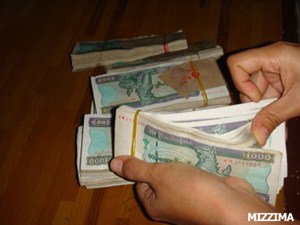The Burmese government will move to equalize its foreign exchange rates following a trial foreign exchange auction this month, a central bank official told Reuters news agency on Monday.
 Burma is trying to integrate its economic system to international standards, and the float will mark the most substantial economic reform yet, and follows extensive political reforms.
Burma is trying to integrate its economic system to international standards, and the float will mark the most substantial economic reform yet, and follows extensive political reforms.
The currency float is a major step in Burma’s drive to normalize relations with Asian and Western countries, and will open the door to foreign investors to shore up its largely dormant domestic economy.
“Arrangements are under way to float the kyat against the U.S. dollar effective April 1 through a sealed auction system,” the official, who declined to be named, told Reuters.
“It's a managed float system. Every day the central bank will invite sealed bids for a certain amount of U.S. dollars from 11 private banks, which have been granted Authorized Dealer Licenses,” the official told the news agency.
The International Monetary Fund is currently engaged in extensive consultations with Burma, advising on how to integrate its foreign exchange system to unify exchange rates.
The official said the government had calculated the national budget for the year from April 1 using an exchange rate of 800 kyat per dollar, which corresponds to the black market rate in recent weeks.
Since 1977, Burma has used an arcane system in which the kyat has been pegged to the International Monetary Fund's (IMF) special drawing rights, with one dollar equaling 6.4 kyat. Most private transactions ignored the government-set rate in favor of the black market rate.
The black market rate has fluctuated wildly, rising to more than 1,000 per dollar in 2009 as foreign money as foreign money was invested in timber, energy and gem sectors, putting many other sectors at risk.
IMF economic advisers have been working closely with Burma to manage the transition, which is essential if Burma is to attract foreign investment in its resource-rich sectors and take advantage of the lifting of economic sanctions, which could begin sometime following the April 1 by-elections.
Burma is beset by many other problems, however, including an outdated infrastructure system, poor communications, a lack of electricity, a censored media, a gutted education system, a Parliament that is still learning how to produce legislation, and a government bureaucracy that is used to being controlled by the military.



